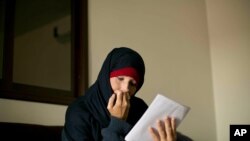Canada has failed to take back dozens of Canadian citizens detained in Syria for suspected links with the Islamic State (IS) terror group, an international rights watchdog said.
The New York-based Human Rights Watch (HRW) said in a report released Monday that Canadian authorities have not repatriated any of the estimated 47 Canadians who have been detained in overcrowded camps in northeast Syria.
The HRW said during the coronavirus outbreak Canada has repatriated 40,000 Canadian citizens from 100 countries, including 29 from Syria, but has failed to bring back those held in Syrian detention camps.
“If Canada can bring home tens of thousands of citizens from around the world in a matter of weeks, surely it can find a way to repatriate fewer than 50 others trapped in horrific conditions in northeast Syria,” Letta Tayler, a senior crisis and conflict researcher at HRW, said in a statement Monday. “The lives of Canadians are on the line, and the time to bring them home is now.”
Among those detainees are 26 children, most of whom are under the age of six.
Canadian officials say they are aware of Canadian citizens held in northeast Syria and that they are “particularly concerned with cases of Canadian children in Syria.”
“Canadian consular officials are actively engaged with Syrian Kurdish authorities to seek information on Canadians in their custody. We continue to monitor the situation very closely,” Barbara Harvey, a spokesperson for Canadian Foreign Affairs Ministry, told VOA.
Given the security situation on the ground and the current COVID-19 context, Canada’s ability to provide any kind of consular assistance in Syria remains limited, Harvey added.
Despite Canada’s security concerns, the HRW report said that dozens of other countries, including the United States, Germany and France, have repatriated their citizens from Syria.
Last week, France took back 10 children of IS fighters who were held in Kurdish-run camps in northeast Syria.
Dire conditions
There are about 12,000 foreigners held at three camps for displaced people in northeast Syria, including al-Hol Camp where humanitarian groups say they suffer malnutrition and disease.
Amarnath Amarasingam, an assistant professor who teaches extremism and terrorism at Queen’s University in Ontario, Canada, visited al-Hol Camp last year.
“Al-Hol can only be described as an urgent humanitarian catastrophe… It’s crowded, it’s dirty, violence breaks out often, and there are just small children everywhere,” he told VOA.
Amarasingam said, “Around April 2018, there was definitely contact between Canadian officials and their Kurdish counterparts.”
“Canadian officials even spoke to some of the detainees and started paperwork to get them identification documents and so on,” he said, “Then, a month later, the whole process was mysteriously shelved. It’s not clear why, but there has been no new attempt to repatriate Canadians.”
Contacted by VOA, Kurdish officials declined to comment on whether there has been recent contact between them and Canadian authorities regarding Canadian citizens held in Syria, including 8 men who are accused of fighting for the Islamic State.
But a Canadian official told VOA on a condition of anonymity that, “Investigating, arresting, charging and prosecuting any Canadian involved in terrorism or violent extremism is a priority for the Government of Canada.”
Foreign fighters
Syrian Kurdish officials have called on countries to take back their detained citizens, cautioning they do not have enough resources to keep IS prisoners and their families indefinitely.
In addition to women and children, the U.S.-backed Syrian Democratic Forces (SDF) has more than 10,000 IS fighters in their custody, including about 2,000 who come from more than 50 countries.
U.S. military officials say their SDF partners in Syria have been overwhelmed to keep IS prisoners.
“The global coalition believes that through appropriate international laws and protocols, there should be a final resolution for what happens with the foreign terrorist fighters,” Col. Myles Caggins, spokesman for the anti-IS global coalition, told VOA in a recent interview.
He added that the coalition continues to support the SDF with stipends for the detention center guards and equipment “to make the detention centers safer for the Asayish [Kurdish security forces] who are providing security, as well as safer and more humane treatment for the detainees.”
Over the past few months, there have been several prison break attempts by IS prisoners held in a detention facility in the northeastern Syrian city of Hasakah. The most recent one was on Monday when a riot took place inside a major IS detention center in the city, triggering a rapid response by SDF fighters and their coalition backers to contain the situation, local news reported.
In a congressional testimony in March, General Kenneth F. McKenzie Jr., commander of United States Central Command, said the best way to alleviate the problem of IS prisoners in Syria is to repatriate them.
“While some countries have made efforts to reclaim their foreign fighters, full resolution requires a comprehensive diplomatic and international effort,” Gen. McKenzie said, adding that, “This problem will not go away by ignoring it, and can only be addressed by the international community working together to accept its shared responsibilities.”
Local Kurdish authorities have said since the international community doesn’t have concrete plans to repatriate and prosecute IS prisoners in their home countries, they would proceed to try them in local courts in Syria.
However, rights groups fear that given the current security situation in Syria, it would be challenging to make sure IS prisoners receive fair trials.
“The fact that the Syrian government led by [President Bashar] Assad has little real control over the country and no due process, and SDF territory has a multitude of militias and foreign militaries present, the process of trying detainees in court is convoluted and difficult,” Philippe Nassif, Advocacy Director for Middle East and North Africa at Amnesty International, told VOA.




